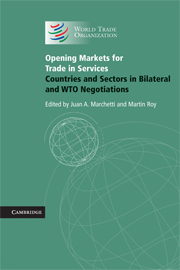Book contents
- Frontmatter
- Contents
- List of figures
- List of tables
- List of boxes
- List of contributors
- Foreword
- Acknowledgments
- Disclaimer
- Summary and overview
- PART I From Policy to Negotiations
- 1 Services trade and growth
- PART II Multilateral and Bilateral Negotiations on Services: Overall Perspectives
- PART III Challenges, Issues and Opportunities in Services Sectors
- PART IV Country Experiences with Services Trade
- Index
- References
1 - Services trade and growth
Published online by Cambridge University Press: 05 December 2011
- Frontmatter
- Contents
- List of figures
- List of tables
- List of boxes
- List of contributors
- Foreword
- Acknowledgments
- Disclaimer
- Summary and overview
- PART I From Policy to Negotiations
- 1 Services trade and growth
- PART II Multilateral and Bilateral Negotiations on Services: Overall Perspectives
- PART III Challenges, Issues and Opportunities in Services Sectors
- PART IV Country Experiences with Services Trade
- Index
- References
Summary
One of the stylized facts of economic development is that the share of services in GDP and employment rises as per capita income increases. In the lowest-income countries, services generate some 35 percent of GDP. This rises to over 70 percent of national income and employment in OECD countries. The expansion in the services intensity of economies is driven by a number of factors. Standard explanations revolve around both demand- and supply-side factors, including income elasticities of demand for services that exceed one, limited scope for labor productivity improvements in the supply of consumer (final product) services, and the rise in demand for coordination and intermediation services associated with structural change (e.g. the shift out of subsistence agriculture, urbanization, changes in business practices) and the expansion of the extent of the market, as well as incentives for firms and government bodies to spin off service activities to specialized providers (outsourcing). Advances in information and communication technologies (ICT) are increasingly permitting cross-border – disembodied – trade in labor-intensive services, accelerating the growth of services activities.
The competitiveness of firms in open economies is increasingly determined by access to low-cost and high-quality producer services – telecommunications, transport and distribution services, financial intermediation, etc. – as well as by the efficiency and effectiveness of public governance and institutions. The widely remarked upon processes variously called global outsourcing, fragmentation, production sharing, and offshoring depend on access to, and the cost and quality of, services – public and private.
- Type
- Chapter
- Information
- Opening Markets for Trade in ServicesCountries and Sectors in Bilateral and WTO Negotiations, pp. 21 - 58Publisher: Cambridge University PressPrint publication year: 2009
References
- 7
- Cited by



